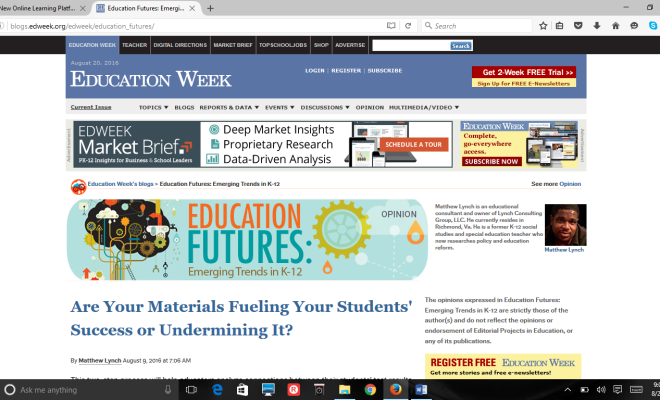The Merits of Using Authentic Assessments

Focused on developing a more authentic, fair method of assessing student knowledge than standardized tests, Grant Wiggins wrote an essay in the early 1990s in which he argued that “As long as we hold simplistic monitoring tests to be adequate models of and incentives for reaching national intellectual standards, student performance, teaching, and our thinking and discussion about assessment will remain flaccid and uninspired.”
The problem then was that educators agreed that students were scoring above average on standardized tests that the tests were driving academic objectives. Basically, teachers taught to the tests and the tests drove educational objectives. He said, “we have lost sight of the fact that a true test of intellectual ability requires the performance of exemplary tasks.”
So, how do educators move from purely pencil and paper assessments to a more authentic representation of student understanding? Wiggins suggests four criteria for authentic assessment:
- Structure—In applying a structure to evaluations, there must not be an unrealistic time constraint (think timed tests). It is not a one-shot opportunity like a traditional test, but a portfolio or a collaboration among several students. It is often public in nature (think in front of other people) rather than accomplished individually.
- Intellectual—The application of knowledge must show a deeper level of understanding especially in real-world contexts, as opposed to “arbitrary” grades. It must involve research by the student in a complex, real context (think a thorny problem of science in the laboratory).
- Fairness—Authentic analysis removes the need to pit student against student while allowing for student styles of learning. It should have some relevance and value to the student.
- Grading—Grades are based on true benchmark achievements which come from clear rubric expectations. It allows for a multi-level grading system as opposed to what is easy to grade, namely a multiple choice test. And, it should reflect stated school learning objectives.
Authentic assessment is not without legitimate challenges. Two Ohio teachers cite the following difficulties as they attempt to use this assessment style.
- Students may not take the project seriously and struggle to put forth their best work.
- Some administrators are not supportive of authentic assessment, seeing it as unstructured and confusing.
- Parents may object and question whether it truly evaluates mastery of academic objectives.
However, the teachers also say that there are characteristics that they love about it. They create an online choice board for comprehension assessment from which the students choose their assignments based on learning style, grammar component, and a written portion.
- Students show increased enthusiasm in reading because they do not have to rush or cram.
- Students can negotiate for a different assessment than the ones listed.
- Students create a product that reflects their learning.
- It is easy to incorporate technology in the assignment.
If implementing authentic assessment in the classroom feels overwhelming, after all, most teachers today are busy every minute of the instructional day with tasks related to teaching, perhaps a scaled version could work. There are quite a few projects and models available online for starting a new way of evaluation. Or, better yet, collaborate with one or two teachers in other disciplines to use a synthesized authentic assessment of a common learning objective.





